An Order Management Software (OMS) is a software solution designed to streamline and automate the process of receiving, processing, and fulfilling customer orders for businesses.
It acts as a central hub that integrates various aspects of order processing, inventory management, and fulfillment, helping businesses effectively manage their sales operations.
An OMS enables businesses to enhance customer satisfaction by ensuring accurate and timely order fulfillment while optimizing internal processes and minimizing errors.
What are Key functions of an Order Management Software?
- Order Processing: OMS allows businesses to capture and process orders from various sales channels, such as online stores, marketplaces, and offline channels.
- Inventory Management: The system tracks inventory levels in real time, helping businesses avoid overselling and stockouts. It provides insights into stock availability across different locations.
- Fulfillment Optimization: OMS assists in determining the best fulfillment location based on factors like inventory levels, proximity to the customer, and shipping costs.
- Order Tracking: Customers and businesses can track the status of orders, including shipping and delivery updates.
- Multi-Channel Integration: OMS integrates with various sales channels and marketplaces to centralize order processing and management.
- Customer Communication: The system facilitates communication with customers by sending order confirmation emails, shipping notifications, and updates on order status.
- Returns and Exchanges: OMS manages the return and exchange process, ensuring efficient processing and tracking of returned items.
- Reporting and Analytics: It provides insights into order trends, sales performance, and inventory turnover, aiding in informed decision-making.
What are the best Order Management Software & tools?
- SAP Commerce Cloud
- Oracle Order Management Cloud
- Magento Order Management
- Shopify
- TradeGecko
- Brightpearl
- Fishbowl Inventory
- Zoho Inventory
- Cin7
- Orderhive
- Skubana
- Stitch Labs
- Unleashed
1. SAP Commerce Cloud
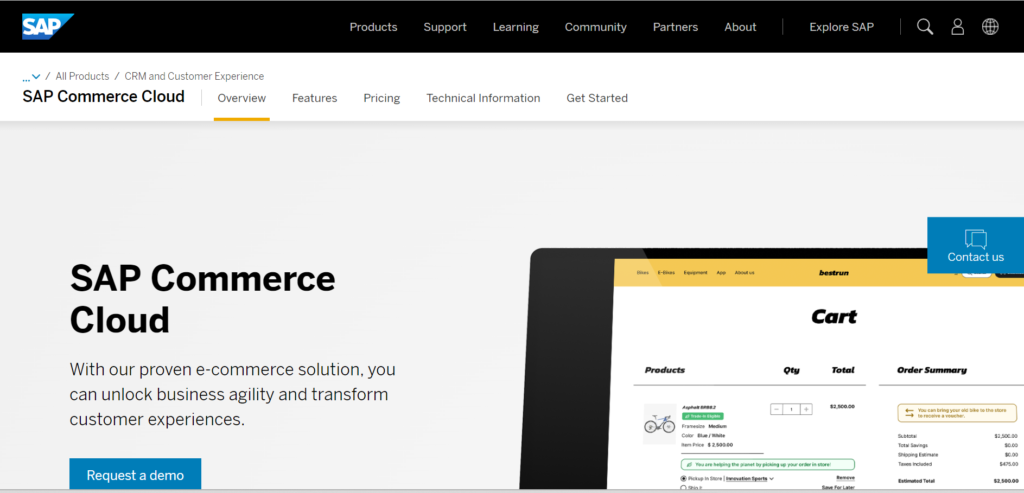
SAP Commerce Cloud is a comprehensive solution that offers robust order management capabilities along with e-commerce functionalities. This platform empowers businesses to provide seamless shopping experiences across various channels while effectively managing orders. With SAP Commerce Cloud, businesses can optimize order fulfillment, enhance customer satisfaction, and improve operational efficiency.
Key Features:
- Multi-Channel Integration: SAP Commerce Cloud allows businesses to integrate and manage orders from multiple channels, providing a unified view of customer interactions.
- Real-time Inventory Tracking: The system provides accurate inventory insights, minimizing stockouts and overstocks.
- Fulfillment Optimization: Businesses can intelligently choose the best fulfillment location based on factors like inventory availability and shipping costs.
- Order Tracking and Notifications: Customers receive timely updates on their orders, enhancing their shopping experience.
- Advanced Reporting: The platform offers detailed analytics and reporting tools to help businesses make informed decisions.
- Customization: SAP Commerce Cloud can be tailored to fit specific business processes and requirements.
SAP Commerce Cloud is a comprehensive solution suitable for medium to large businesses aiming to enhance their order management and e-commerce capabilities. While it offers robust features, potential users should consider the implementation costs and the need for IT expertise.
2. Oracle Order Management Cloud
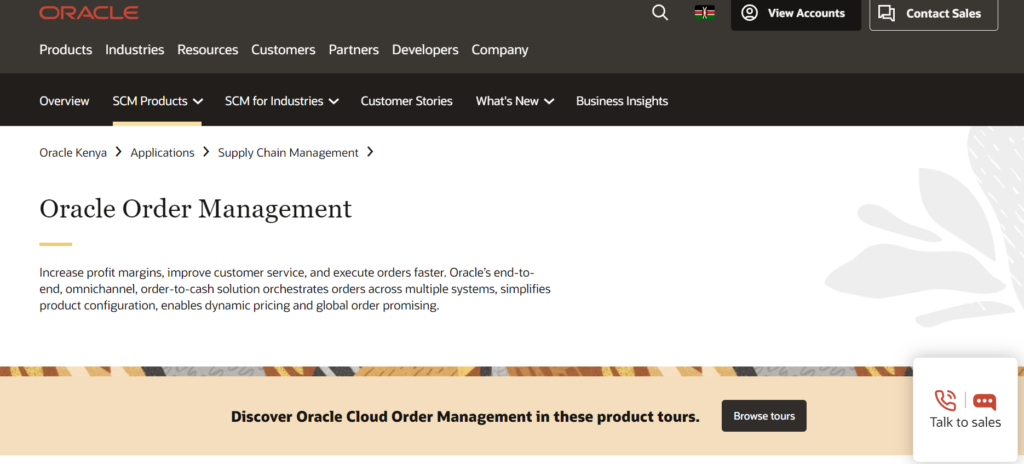
Oracle Order Management Cloud is a part of Oracle’s suite of cloud-based enterprise solutions. It focuses on streamlining order management processes, helping businesses achieve efficient and accurate order fulfillment. With features like real-time order visibility and integration with other Oracle applications, this solution caters to businesses of various sizes.
Key Features:
- Real-time Order Tracking: Oracle Order Management Cloud provides real-time visibility into order status, improving customer communication.
- Configurable Workflows: The system allows businesses to design order processing workflows that align with their unique processes.
- Integration with Oracle Suite: Integration with other Oracle Cloud applications ensures seamless data flow across the enterprise.
- Customer Self-Service: Customers can view order status and manage returns through a self-service portal.
- Advanced Analytics: The platform offers comprehensive analytics to monitor order trends and performance.
In conclusion, Oracle Order Management Cloud is a suitable choice for businesses already invested in the Oracle ecosystem. Its integration capabilities and configurable workflows can streamline order management processes and enhance customer satisfaction.
3. Magento Order Management
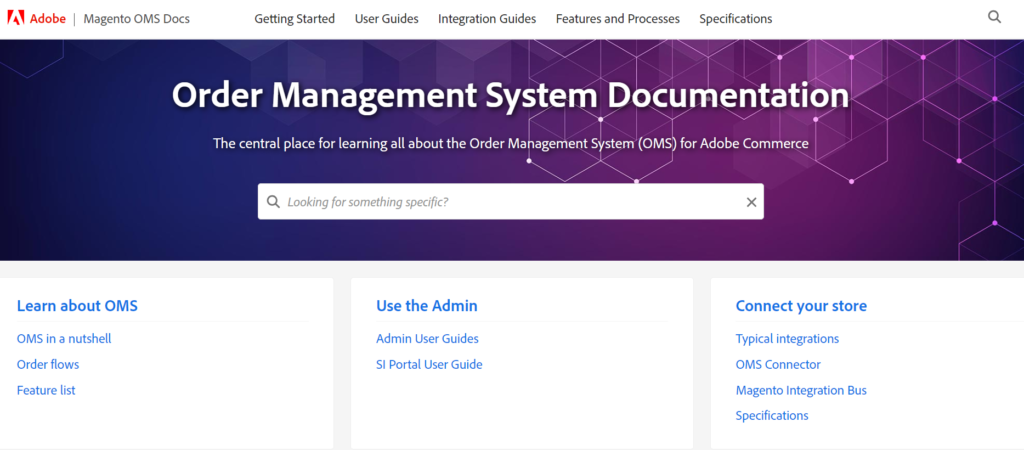
Magento Order Management is designed to simplify the complexities of order processing for e-commerce businesses using the Magento platform. It offers a centralized hub for managing orders, inventory, and fulfillment, helping businesses deliver a seamless shopping experience.
Key Features:
- Multi-Channel Order Consolidation: The system combines orders from various sales channels for streamlined processing.
- Inventory Management: Real-time inventory tracking prevents stockouts and optimizes replenishment.
- Automated Order Routing: Orders are automatically directed to the most appropriate fulfillment center.
- Customer Communication: Customers receive updates on order status and tracking information.
- Integration with Magento: As a Magento product, it seamlessly integrates with Magento-powered online stores.
- Customizable: The platform can be tailored to fit unique business needs and workflows.
In conclusion, Magento Order Management is an excellent choice for e-commerce businesses using the Magento platform. Its integration capabilities and automation features contribute to efficient order management and customer satisfaction.
4. Shopify

Shopify is a widely used e-commerce platform that offers built-in order management capabilities. While primarily known for its online store features, Shopify provides tools to manage orders and track inventory effectively.
Key Features:
- Order Processing: Easily process orders from various channels within the Shopify dashboard.
- Inventory Tracking: Real-time inventory updates help prevent stockouts and overselling.
- Automatic Order Fulfillment: Shopify can automatically fulfill orders and send tracking information.
- Mobile App: The Shopify mobile app allows you to manage orders on the go.
- Third-party App Integration: The Shopify App Store offers additional order management apps for customization.
- User-Friendly: Shopify’s intuitive interface requires minimal training.
In conclusion, Shopify is a solid choice for small to medium-sized businesses that prioritize simplicity and ease of use. While it might not offer the same extensive features as dedicated OMS platforms, it integrates seamlessly with the Shopify e-commerce ecosystem.
5. TradeGecko
TradeGecko is a cloud-based inventory and order management platform that targets businesses involved in wholesale and distribution. It offers tools to manage orders, inventory, and customers in one centralized system.
Key Features:
- Inventory Management: Real-time updates on stock levels prevent overstocking and stockouts.
- Order Processing: Manage orders from multiple sales channels and track their status.
- B2B Features: TradeGecko supports wholesale features like tiered pricing and custom catalogs.
- Integration: Integrate with e-commerce platforms, accounting software, and other tools.
- Multi-Channel Sales: Manage orders from various channels and marketplaces in one place.
- Reports and Analytics: Access insights into sales trends and inventory turnover.
In conclusion, TradeGecko is an excellent choice for businesses engaged in wholesale and distribution. Its B2B features and multi-channel capabilities make it a comprehensive solution for managing orders and inventory.
6. Brightpearl
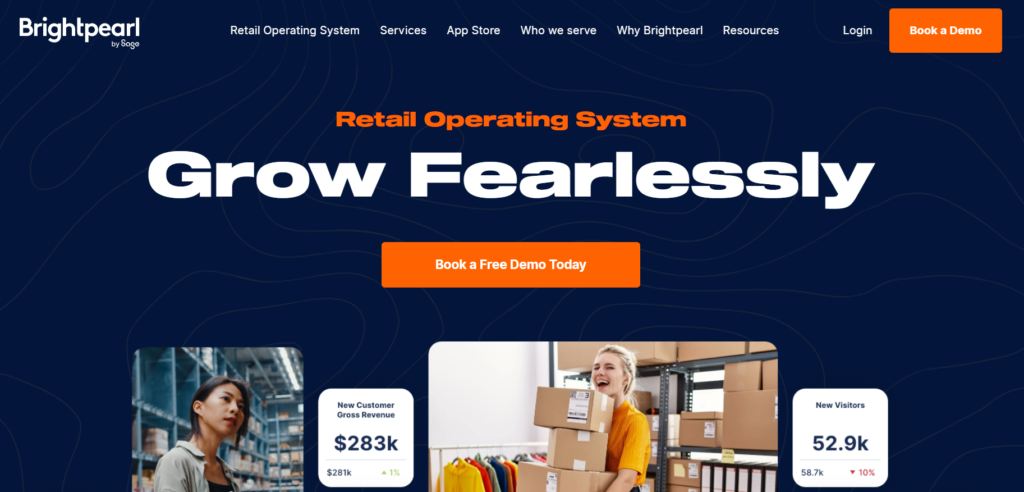
Brightpearl is an integrated retail operations platform that includes order management, inventory management, accounting, and more. It targets retail and wholesale businesses looking for end-to-end solutions.
Key Features:
- Centralized Management: Manage orders, inventory, and customers from a single platform.
- Integration: Connect with e-commerce platforms, marketplaces, and accounting software.
- Real-time Insights: Gain visibility into order and inventory status in real-time.
- Multi-Channel Order Processing: Handle orders from different sales channels.
- Automated Workflows: Streamline order processing with automated workflows.
- Reporting: Access a variety of reports and analytics for informed decision-making.
In conclusion, Brightpearl offers a comprehensive suite of retail operations tools suitable for businesses seeking integrated solutions. Its order management features, combined with inventory and accounting capabilities, make it a powerful option.
7. Fishbowl Inventory
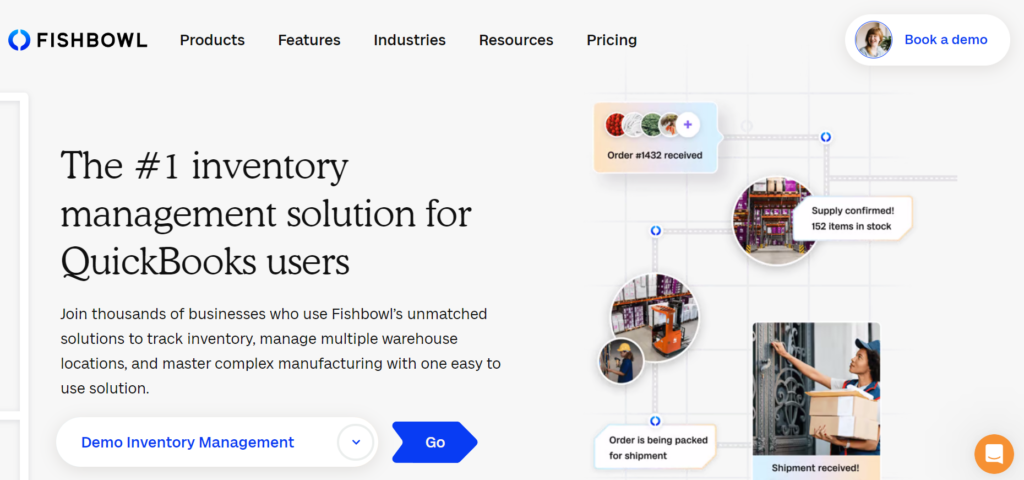
Fishbowl Inventory is designed to provide inventory and order management solutions to small and medium-sized businesses. It integrates with various accounting software platforms to offer a holistic view of business operations.
Key Features:
- Order Processing: Manage sales orders, purchase orders, and work orders in one system.
- Inventory Tracking: Real-time inventory updates prevent stockouts and improve order accuracy.
- Integration with Accounting Software: Seamlessly integrates with popular accounting software.
- Multi-Location Support: Suitable for businesses with multiple warehouses or locations.
- Customizable Reports: Create and access customized reports for insights into operations.
- Barcoding and Scanning: Streamline order processing with barcode scanning.
In conclusion, Fishbowl Inventory is a solid choice for small and medium-sized businesses looking for a comprehensive inventory and order management solution. Its integration with accounting software and multi-location support enhances its suitability for growing businesses.
8. Zoho Inventory
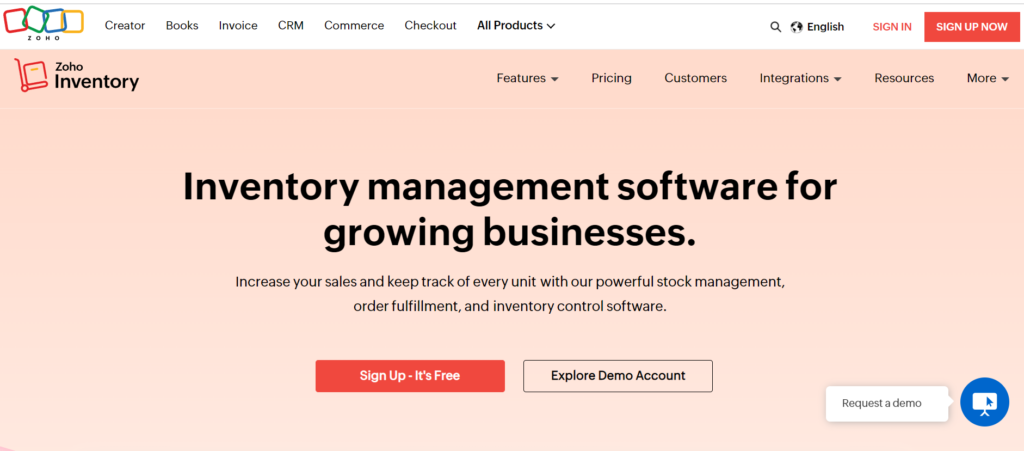
Zoho Inventory is part of the Zoho suite of business software solutions. It focuses on inventory and order management for small and medium-sized businesses, providing tools to streamline operations.
Key Features:
- Order Processing: Manage sales orders, purchase orders, and invoices in one place.
- Multi-Channel Sales: Integrate with various e-commerce platforms and marketplaces.
- Inventory Control: Real-time tracking of inventory levels and reorder points.
- Integration with Zoho Suite: Seamlessly integrates with other Zoho applications.
- Reporting: Access a variety of reports for insights into sales and inventory.
- User-Friendly Interface: Intuitive interface suitable for users with varying technical skills.
Zoho Inventory is a suitable choice for small and medium-sized businesses looking for a user-friendly order and inventory management solution. Its integration with other Zoho applications can enhance overall business efficiency.
9. Cin7
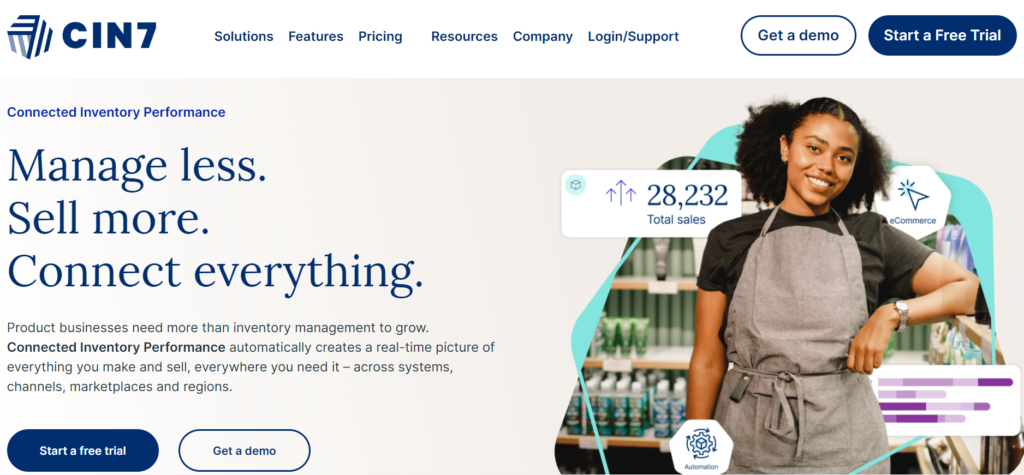
Cin7 is a cloud-based inventory and order management solution aimed at businesses with complex inventory needs, particularly those in the retail, wholesale, and manufacturing sectors.
Key Features:
- Inventory Management: Handle complex inventory scenarios, including bundles and kits.
- Multi-Channel Sales: Integrate with various sales channels and marketplaces.
- Advanced Order Fulfillment: Automate order routing and manage backorders.
- EDI Integration: Connect with trading partners using electronic data interchange (EDI).
- Reporting and Analytics: Access comprehensive insights into sales and inventory.
- Integration with E-Commerce Platforms: Seamlessly integrates with popular e-commerce platforms.
Cin7 is a powerful solution for businesses with intricate inventory requirements, such as retail and manufacturing. Its advanced features and integration capabilities can streamline complex order and inventory management processes.
10. Orderhive
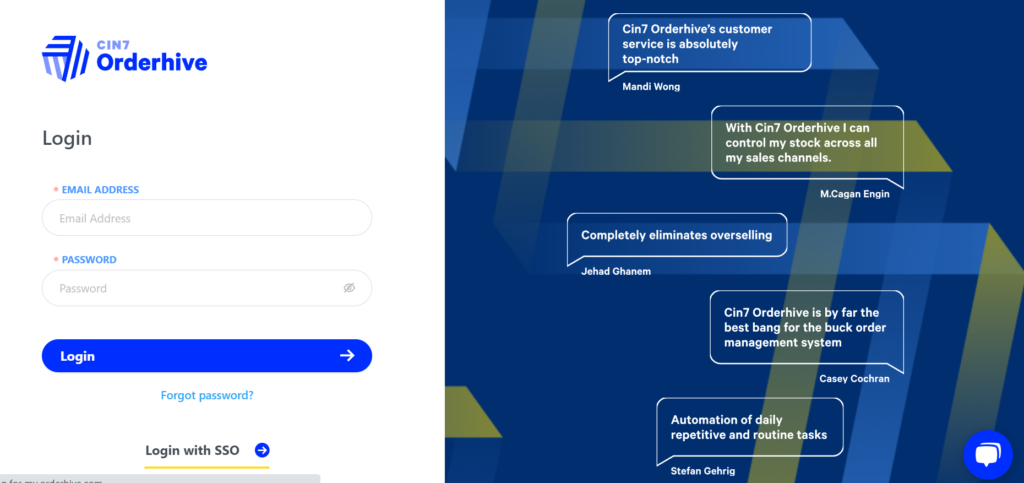
Orderhive is a cloud-based order and inventory management platform suitable for e-commerce businesses of varying sizes. It offers features to streamline order processing and improve customer experiences.
Key Features:
- Multi-Channel Integration: Integrate with multiple sales channels and marketplaces.
- Order Processing: Manage orders from various channels in one centralized system.
- Inventory Tracking: Real-time updates on inventory levels prevent stockouts.
- Shipping Management: Generate shipping labels and track shipments.
- Returns Management: Handle returns and exchanges with ease.
- Analytics and Reports: Access insights into sales and inventory trends.
In conclusion, Orderhive is a user-friendly solution suitable for e-commerce businesses looking to streamline their order and inventory management processes. Its emphasis on multi-channel integration and shipping management makes it a solid choice.
11. Skubana

Skubana is an all-in-one operations platform designed to help businesses manage their order fulfillment, inventory, and analytics in one place. It targets e-commerce businesses aiming for efficiency.
Key Features:
- Multi-Channel Integration: Manage orders from various sales channels.
- Inventory Management: Real-time updates on inventory levels.
- Order Processing: Automate workflows for faster order fulfillment.
- Analytics and Insights: Access detailed reports and insights into operations.
- Shipping Management: Generate shipping labels and manage shipments.
- Customizable: Tailor the platform to meet specific business needs.
In conclusion, Skubana offers comprehensive order and inventory management solutions for e-commerce businesses. Its focus on automation and analytics can improve operational efficiency.
12. Stitch Labs
Stitch Labs is a cloud-based inventory and order management solution targeting businesses with omnichannel operations. It offers features to streamline order processing and maintain accurate inventory levels.
Key Features:
- Multi-Channel Integration: Integrate orders from various sales channels.
- Inventory Control: Real-time tracking of inventory across channels.
- Order Routing: Automate order routing to appropriate fulfillment centers.
- Returns Management: Handle returns and exchanges efficiently.
- Integration with E-Commerce Platforms: Seamlessly integrates with e-commerce platforms.
- Analytics and Reporting: Access insights into sales and inventory performance.
In conclusion, Stitch Labs provides a solid solution for businesses with omnichannel operations. Its focus on automation and integration can help streamline order and inventory management processes.
13. Unleashed
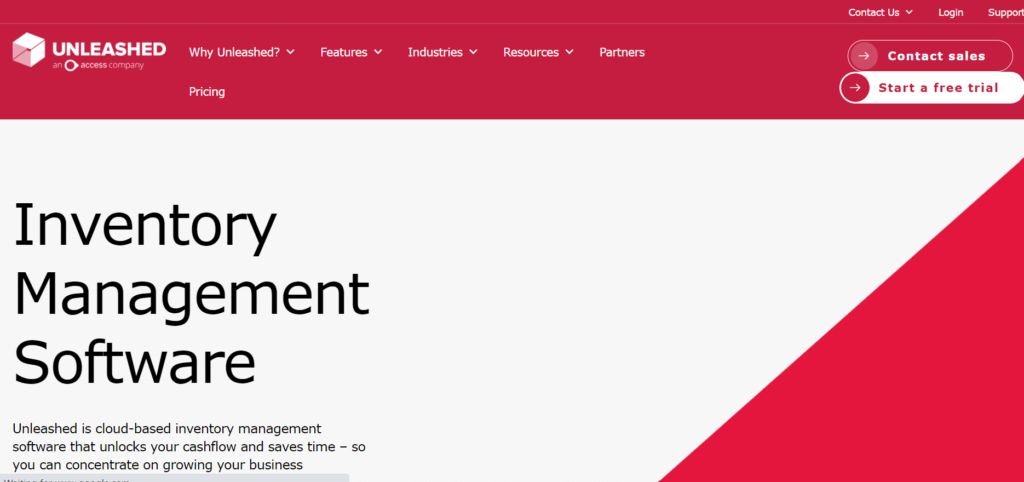
Unleashed is a cloud-based inventory and order management solution targeted at businesses dealing with manufacturing, wholesale, and distribution. It offers tools to manage orders and inventory effectively.
Key Features:
- Order Management: Process sales orders, purchase orders, and work orders.
- Inventory Tracking: Real-time updates on inventory levels.
- Multi-Currency Support: Suitable for businesses dealing with international transactions.
- Integration: Connect with various e-commerce platforms and accounting software.
- Reports and Analytics: Access insights into sales trends and inventory turnover.
- Mobile App: Manage orders and inventory on the go.
In conclusion, Unleashed is a strong solution for businesses involved in manufacturing, wholesale, and distribution. Its multi-currency support and integration capabilities can benefit international operations.
Key takeaways on Order Management Systems:
In today’s competitive business landscape, efficient order management is crucial to ensuring customer satisfaction and operational excellence. The right order management system can provide businesses with the tools to optimize inventory, streamline order processing, and enhance customer communication.
By carefully evaluating factors such as scalability, integration capabilities, customization options, and user-friendliness, organizations can select an OMS that aligns with their specific needs and growth goals.
Whether it’s catering to wholesale, retail, or e-commerce, a well-chosen OMS can contribute significantly to a business’s success.
What to Consider When Choosing the Best Order Management System:
Choosing the right Order Management System (OMS) is crucial for streamlining your business operations and ensuring customer satisfaction.Here are some key factors to consider:
Business Needs:
- Order volume and complexity: Consider the number of orders you handle, their types (single vs. multi-item, domestic vs. international), and any specific requirements.
- Sales channels: Does the OMS integrate with your existing e-commerce platforms, marketplaces, and other sales channels?
- Inventory management: How does the OMS handle inventory levels across multiple locations, track stock, and suggest reorders?
- Shipping and fulfillment: Does the OMS offer shipping rate calculations, label generation, multi-warehouse fulfillment options, and integration with carriers?
- Scalability: Can the OMS grow with your business, accommodating future increases in orders, products, and channels?
Features and Functionality:
- Order processing: Look for automation features like order validation, fraud checks, and automatic order routing.
- Inventory management: Real-time inventory tracking, stock level alerts, and multi-location support are essential.
- Reporting and analytics: Track key metrics like order fulfillment times, shipping costs, and customer returns.
- Integrations: Seamless integration with your existing systems like ERP, accounting software, and CRM is crucial.
- Security and compliance: Ensure the OMS meets data security standards and PCI compliance requirements.
Additional Considerations:
- Budget: OMS pricing varies based on features, usage, and support. Determine your budget and choose a system that fits your needs without overspending.
- Implementation and training: Consider the ease of implementation, training resources, and ongoing support offered by the vendor.
- Vendor reputation and reviews: Research the vendor’s track record, industry reputation, and customer reviews.
FAQs on the Best Order Management Systems
- What is an Order Management System (OMS)?
An OMS is a software solution designed to streamline order processing, inventory management, and fulfillment for businesses. It integrates various sales channels, automates workflows, and enhances visibility into order and inventory status. - What factors should I consider when choosing an OMS?
Key factors include scalability, integration capabilities, inventory management features, order tracking and notifications, reporting and analytics, customization options, user-friendliness, and customer support. - Which businesses benefit most from OMS solutions?
Businesses of all sizes can benefit from OMS solutions. However, OMS solutions like SAP Commerce Cloud and Oracle Order Management Cloud are well-suited for medium to large enterprises, while platforms like Shopify and Orderhive cater to smaller businesses. - What role does integration play in OMS selection?
Integration is crucial for seamless data flow across various business systems. An OMS should integrate with your e-commerce platform, accounting software, and other tools to prevent data silos. - How do OMS solutions enhance customer experiences?
OMS solutions provide real-time order tracking, order status notifications, and accurate inventory updates. This leads to improved customer communication, reduced shipping delays, and increased customer satisfaction. - Are there OMS solutions specifically for wholesale businesses?
Yes, several OMS solutions like TradeGecko, Brightpearl, and Skubana are tailored to meet the needs of wholesale and distribution businesses. They offer features such as multi-tier pricing, custom catalogs, and bulk order management. - What is the significance of reporting and analytics in OMS?
Reporting and analytics tools in OMS solutions offer insights into sales trends, inventory turnover, and operational performance. This data helps businesses make informed decisions, optimize inventory levels, and identify areas for improvement. - Can OMS solutions be customized to fit unique business processes?
Many OMS solutions offer customization options to tailor the system to your specific workflows and requirements. This allows businesses to adapt the software to their existing processes for better efficiency. - What is the cost of implementing an OMS?
The cost of implementing an OMS varies based on factors such as the chosen solution, the size of your business, and the complexity of your operations. It may include upfront costs, subscription fees, and potential customization expenses. - How do I ensure a successful OMS implementation?
To ensure a successful OMS implementation, collaborate closely with the software provider, allocate sufficient resources for training and onboarding, and involve relevant stakeholders. Thoroughly test the system before full deployment to identify and resolve any issues. - Is ongoing support important when using an OMS?
Yes, ongoing customer support is crucial for smooth OMS operation. Ensure that the chosen provider offers reliable customer support and timely assistance to address any technical issues or concerns that may arise during usage.





